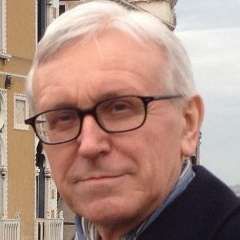Beethoven’s Piano Concerto no. 5 in E flat major is called the “Emperor” only in anglophone countries. The nickname came not from Beethoven, but from JB Cramer, the concerto's publisher in England. It has stately qualities and is expansive in manner, but those are not reasons to limit it to the most grandiose and imperious interpretations. Perhaps especially if the soloist comes from North Macedonia and the conductor from Italy. Pianist Simon Trpčeski and Gianandrea Noseda, Principal Guest Conductor of the London Symphony Orchestra, might have first encountered it as nameless, but the last and largest of the composer’s piano concertos.
But to offer the interpretation they did here required some close collaboration, and even nerve. People might have found it emasculated, or post-imperial. The LSO was not encouraged by Noseda to show off its muscular qualities, but rather to play their part(s) with expressive feeling, matching the soloist. Glenn Gould arrived at a recording session and announced “Well, maestro we can record the fastest or slowest Emperor, which is it to be?” Here middle of the road tempi prevailed and persuaded. Trpčeski’s fleet-fingered, lightly-pedalled account was elegance itself, and if the orchestra was never robust, it was always rhythmic and alert. No nod towards that imperial tradition was indulged so we heard the work for what it might truly be, the last of the great Classical piano concertos.
Shostakovich’s Symphony no. 13 in B flat minor does have a title from the composer, “Babi Yar”, the ravine near Kyiv where 34,000 Jews were slaughtered by the Nazis in 1941, and title of the memorial poem by Yevgeny Yevtushenko (1933-2017) which inspired the composer to his setting. He added three more published poems of Yevtushenko and commissioned a fifth from the poet for his finale. The premiere was resisted by the authorities but eventually went ahead.
The score asks for a choir of basses, and the males of the London Symphony Chorus and London Philharmonic Choir (tenors too), prepared by their distinguished guest chorusmaster, Aidan Oliver, gave a fine account of their substantial role. The Ukrainian bass Vitalij Kowaljow, a veteran of Russian opera repertoire (plus Wagner’s Wotan), had sung the bass solo in Shostakovich’s 14th Symphony in 2021, in this Noseda/LSO cycle being recorded for LSO Live. He once again brought drama and authority to the range of his part (wider than it first seems).
But the hero was Noseda, identifying with every bar of this demanding score. This sometimes harrowing but ultimately transfiguring piece perfectly balances orchestral, choral and solo contributions, and Noseda seemed to give attention to each exactly when it was needed, often with a thrust that makes clear that for all the power of the texts, this is symphonic music. Has the work had many better performances in the West? I heard it live only once before, some years ago with an eminent Russian group, yet ended unsure of the work’s status in the cycle. After this, I will swear on my copy of Yevtushenko’s poetry that it is the best of them.




